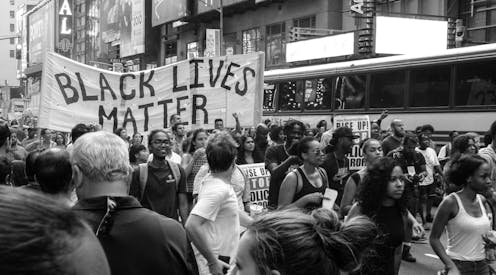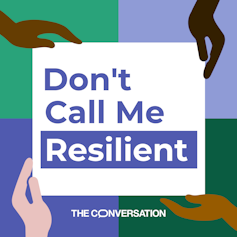
February is Black History Month, and this year the theme is Resistance.
The podcast episodes on this playlist showcase some of our favourites from The Conversation Canada’s audio content related to Black history, from our flagship podcast, Don’t Call Me Resilient.
These conversations with scholars and activists are as urgent and important now as they were when we first recorded them. The episodes on this playlist span the start of the pandemic with its worldwide demonstrations against anti-Black racism, to the most recent violence this winter.
In all of these episodes, passionate experts get into their research and ideas, helping to provide context, history and their unique analysis to current events, trends and breaking news.
Topics in this playlist include: Why the n-word is so traumatic, how to live peacefully and joyfully while continuously confronting racism; how to explain what critical race theory is; why long COVID impacts women of colour at higher rates; and how we need to do something about the rising violence in schools.

As we share this playlist, we are also busy putting together Season 5 of Don’t Call Me Resilient. We’d love to hear from you! Send us ideas on what you’d like to hear about, what you don’t want to hear about, and story ideas for what you think we should cover.
And be on the lookout! We are creating another playlist of fellow podcasters who are also examining the world around us and current events through a critical race lens. (Someone on Twitter recently said, instead of calling it critical race theory, we should just call it American history). So send us your favourite episodes and we will add it to the list.
Join our conversation on Twitter, Facebook, Instagram and TikTok using #DontCallMeResilient.
Here is our Don’t Call Me Resilient playlist and below are the links and descriptions to individual episodes.
Don’t Call Me Resilient playlist:
What’s in a word? How to confront 150 years of racial stereotypes
We keep hearing stories about people, including scholars, who continue to use the n-word. Toronto-based Professor Cheryl Thompson, author of Uncle: Race, Nostalgia and the Politics of Loyalty, discusses why it’s not OK. She talks about how North American culture has spent the last 150 years building anti-Black tropes, how they continue to persist today — and how we can confront it.
How to deal with the pain of racism — and become a better advocate
The global protest movement that grew after George Floyd’s murder in May 2020 that called for an end to racism and police brutality sparked new conversations about racism. But it also surfaced a lot of pain for those who deal daily with racism. In this episode, Zen priest, writer and activist, Reverend angel Kyodo williams speaks about the pain of racism, and how she uses meditation to combat it and become a stronger anti-racist activist in America today.
How to spark change within our unequal education system
Education experts have long been sounding the alarm about the future of racialized children in our schools. These warnings became more prevalent in the past two years as the COVID-19 pandemic exacerbated a deepening divide in how racialized students experience the education system. Carl James, professor of education at York University and Kulsoom Anwer, a high school teacher who works out of one of Toronto’s most marginalized neighborhoods, Jane and Finch, join us to discuss the injustices and inequalities in the education system — and the way forward.
Black health matters
When COVID-19 first appeared, some said it was the great equalizer. But the facts have now revealed a grim reality: COVID-19 disproportionately impacts Black, Indigenous, poor and racialized communities. Roberta K. Timothy, assistant professor at the Dalla Lana School of Public Health at the University of Toronto, joins us to talk about her global research project, Black Health Matters, and why racial justice is a public health matter.
How stories about alternate worlds can help us imagine a better future
Stories are a powerful tool to resist oppressive situations. They give writers from marginalized communities a way to imagine alternate realities, and to critique the one we live in. In this episode, Vinita speaks to two storytellers who offer up wonderous “otherworlds” for Indigenous and Black people. Selwyn Seyfu Hinds is an L.A-based screenwriter who wrote for Jordan Peele’s The Twilight Zone and is currently writing the screenplay for Esi Edugyan’s Washington Black. Daniel Heath Justice is professor and Canada Research Chair in Indigenous literature and expressive culture at the University of British Columbia.
Making our food fairer
In 2021, studies showed that one out of every eight households in Canada is food insecure. For racialized Canadians, that number was higher – two to three times the national average. In this episode, Vinita explored what is happening with our food systems, and what we can do to make them fairer with two women who have been tackling this issue for years. Melana Roberts is Chair of Food Secure Canada and one of the leaders behind Canada’s first Black food sovereignty plan. Also joining the conversation is Tabitha Robin Martens, assistant professor at UBC’s Faculty of Land and Food Systems. Martens researches Indigenous food sovereignty and works with Cree communities to bolster traditional land uses.
Why you shouldn’t be afraid of critical race theory
In this episode, we explore how applying critical race theory in classrooms across Canada helps both students and teachers. Teresa Fowler, assistant professor of Education at Concordia University of Edmonton joins us. So does Dwayne Brown, a PhD student in Education at York University, and a grade seven teacher with the Toronto District School Board. Both Brown and Fowler use critical race theory in their classrooms every day, and say that it helps them to see and evaluate their own biases — while also making students feel truly included in their own education.
Why isn’t anyone talking about who gets long COVID?
Long COVID has been called a mass-disabling event. It hits one in every five people infected with the virus, and hits Black and Latinx women especially hard. Vinita dives into why that is — and why we’re not talking about it — with Margot Gage Witvliet, who has insights into long COVID both as a Black woman who has been suffering the effects of it, and as a social epidemiologist who studies it. Margot is an assistant professor at Lamar University in Beaumont, Tex. She has presented her long COVID findings to the United States Task Force on equity and COVID and runs an online support and advocacy group for BIPOC women living with long COVID.
How can we slow down youth gun violence?
In 2007, 15-year-old Jordan Manners became the first student to be shot and killed inside a Toronto school. Since then, youth violence hasn’t let up in Canada’s largest city. In fact, it’s getting worse. Devon Jones and Ardavan Eizadirad say it’s a major problem that needs a more holistic approach. Ardavan is an assistant professor in the Department of Education at Wilfrid Laurier University who studies the root causes of gun violence. He and Devon run Y.A.A.A.C.E. — a community organization started by Devon that tackles the root causes of youth gun violence in Toronto. They join Vinita to talk about what has been going wrong and how to get it right.
Follow and listen
You can listen to or follow Don’t Call Me Resilient on Apple Podcasts, Google Podcasts, Spotify or wherever you listen to your favourite podcasts.
This article was originally published on The Conversation. Read the original article.







